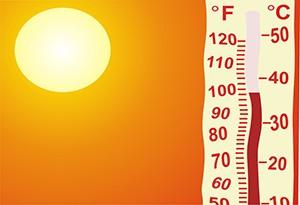Are Engineered Heat Transfer Fluids Better?
 Heat Transfer Fluids
Heat Transfer Fluids
A heat transfer fluid is any fluid (liquid or gas) which is used for any process involving heating or cooling. This could be as simple as water or steam, but may also include engineered heat transfer fluids. Which is better to use?
Engineered Heat Transfer Fluid Advantages
As with anything you must consider the process in which you are applying the fluid. Your application to which the fluids will be applied has a great deal of influence over the selection of which heat transfer fluid to use.
Each has their own advantages and disadvantages in relationship to cause and effect on your process piping and equipment. It is important to select the proper heat transfer fluid to protect process piping and equipment from failure caused by corrosion, pressure and improper mixtures. Careful selection and maintenance can considerably reduce future equipment repair costs.
Engineered Heat Transfer Fluids compared to Water / Steam
The freezing point of an engineered fluid is considerably lower than the freezing point of water, which freezes at 32°f.
- Volume expansion caused by ice crystals forming in water can rupture pipes and damage equipment leading to expensive repairs. Adding antifreeze can mitigate this issue but negatively impacts system performance and increases power consumption.
- Engineered heat transfer fluids allow you to maintain performance while providing freeze protection.
At the opposite extreme the boiling point of water is 212°f at sea level. This requires stronger materials to handle the pressurized condition created above that temperature. engineered heat transfer fluids provide efficient heat transfer over a broad range of temperatures. (-150°f to 650°f)
Engineered Heat Transfer Fluids compared to Direct Heat Application
You benefit from engineered heat transfer fluids by achieving greater control, uniformity and accuracy within your heating or cooling processes over direct heat applications.
Industrial Applications of Heat Transfer Fluids
There exists a wide variety of applications and industries that use heat transfer fluids. Listed below is a short list containing some examples:
- Industrial Food Processing This includes the use of fryers, convection ovens, belt grills, extruders, mixers, kettles, dryers, dehydrators and waste heat recovery.
- HVAC Building unit heaters, in-floor heating, building cooling, steam & hot water generators.
- Die Casting This includes preheating of the die, production temperature control and waste heat recovery.
- Chemical / Petrochemical Batch reactors, distillation columns, autoclaves, condensers, mixers, kettles, storage tanks, dryers, thermal oxidizers, piping, and waste heat recovery.
- Metal Processing Plating and wire draw.
- Plastics This includes molds, barrels and screws of injection molding and blow molding machines, hot laminating rolls, extruder screws, barrels, dies and lost core molding.
Heat Transfer Fluids greatly effect your process and maintenance of your equipment. Careful selection of the proper fluid and mixture is a critical part of your plant's maintenance and production capabilities. No matter which fluid you utilize in your systems, proper repair and maintenance is a must.
Proper Maintenance
Any system that contains antifreeze (glycol) in it needs to be tested periodically. It will break down over time resulting in diminished freeze protection and lower system pH which can cause corrosion. The system should be closely monitored for leaks and detected leaks should be promptly repaired. Fluid leaking out of the system needs to be replaced. Adding straight water to maintain system pressure will dilute the mixture resulting in poor freeze protection and increased corrosion.
For process piping and related maintenance and repair, call AEM Mechanical Services, Inc. at 320-587-0991.
About the author
2008 - 2020 © AEM Mechanical Services, Inc. - all rights reserved
MN License #34376PM
Privacy Policy | Sitemap
Website created by Mid Minnesota Marketing

 Heat Transfer Fluids
Heat Transfer Fluids